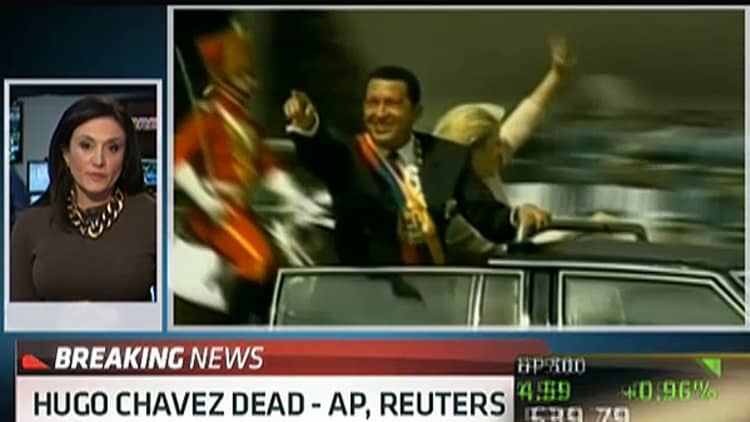Venezuelan President Hugo Chavez has died after a two-year battle with cancer, Vice President Nicolas Maduro said in a televised speech. He was 58.
The fiercely anti-American leader ran Venezuela for 14 years, consistently beating back both domestic opposition and international pressure. After winning re-election in October 2012, Chavez' debilitated state forced him to drop out of sight, causing him to miss his own inauguration as he underwent chemotherapy in Cuba.
As his health reportedly worsened, speculation swirled about who was running the country — and who could take Chavez's place in the event of his likely demise.
Chavez's death opens the way for a new election within 30 days. Appearing on state TV, Venezuela's military chiefs pledged their loyalty to Maduro, who Chavez had named as his preferred successor.
"At this challenging time of President Hugo Chavez's passing, the United States reaffirms its support for the Venezuelan people and its interest in developing a constructive relationship with the Venezuelan government," the White House said in a statement. "As Venezuela begins a new chapter in its history,the United States remains committed to policies that promote democratic principles, the rule of law, and respect for human rights."
(Read More: Traders React: What Chavez Death Means for Oil Market)
Chavez disclosed in 2011 that he had cancer yet never publicly disclosed which form of cancer. He had undergone multiple surgeries for tumors in the stomach and reports from Venezuela suggested it may have been sarcoma, a form of soft-tissue cancer.

One of Latin America's last remaining strongmen, Hugo Rafael Chavez Frias was a former military officer was first elected president of one of Latin America's largest petro-exporting economies in 1999. He immediately harnessed Venezuela's vast oil resources – and his broad support among the poor and working class – to tailor his country and the region into an image more to his liking.
The left-wing and often polarizing populist laid claim to a form of governance called "Bolivarianism", which fused Socialist principles with the ethos of Simon Bolivar, a Venezuelan general who championed South America's independence in the 19th century. That helped Bolivar to achieve folk hero status,which Chavez used to mold his own pan-Latin American beliefs.
Born in 1954 to two school teachers, Chavez first rose to prominence in 1992 when he spearheaded an abortive attempt to overthrow the government of then president Carlos Andres Perez. The revolt claimed nearly 20 lives, and earned Chavez a two year prison sentence before he was pardoned. He then embarked on a political career that ushered him into the presidency in 1999.
In his efforts to craft a new "Bolivarian Republic," Chavez was a frequent and unapologetic antagonist of the United States, aligning his country with other foes of American interests. In a 2006 speech, he famously took to the stage of the United Nations to liken then President George W. Bush to"the devil", adding that the venue "smells of sulfur."
The roots of his fierce U.S. opposition were sown in the aftermath of the Sept. 11 attacks. The Venezuelan leader denounced the Bush administration's anti-terror efforts, and relations with America reached their nadir in 2002, when a group of opponents attempted to overthrow Chavez's government. After his return to power, Chavez accused the U.S. of covertly engineering the coup.
Until his struggle with cancer prompted him to head to Cubato seek medical treatment, Chavez had not been seen in public since December 11.
His absence from Venezuela in the latter days of his life touched off a wave of political wrangling and court decisions, which culminated in a Supreme Court decision that endorsed a postponement of his inauguration.
Members of Venezuela's divided opposition had argued that the constitution demanded a January 10 swearing-in.His presence in Cuba was a product of medical necessity and political expediency. Longtime Cuban leader Fidel Castro was both Chavez's geopolitical ally and a source of ideological inspiration. Cuba was also a beneficiary of Chavez's petro-fueled largesse, with the country frequently receiving shipments of subsidized oil from Venezuela.
Venezuela has the second largest oil reserves in the world — 211 billion barrels, according to the US Energy Information Administration (EIA).They are the fourth largest supplier to the US, providing 951,000 barrels per day.


